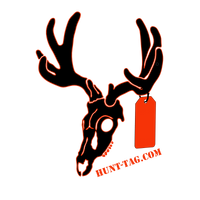
Hunt-Tag: Effective Hunting and Tracking Techniques
The hunting season combines subsistence and recreational activities, particularly in the midwest of the USA. It's when hunters enjoy adrenaline flow as they practice their tracking and hunting skills. However, they must adhere to government regulations outlining where, when, and which animals can be killed.
Each state has primary responsibility and authority over hunting wildlife that resides within state boundaries. Oregon, along with numerous other states, including Arizona, New Mexico, Texas, Indiana, Ohio, West Virginia, and Oklahoma, have implemented an electronic tagging system (e-tagging) – hunters are required to use their own hunting tags with the correct information during the season.
If you require more information, please read, What is a Hunting Tag?
This guide will discuss everything you need to know about the hunting season, including dates, regulations, and safety tips.
Understanding Hunting Seasons: Why They Exist and How They're Determined
A hunting season is a time when hunting and killing certain animals becomes legal. Hunting plays a considerable role in wildlife management, so hunting regulations exist. Hunting regulations exist to specify the type of animal, environment, and specific time.
State authorities determine the season based on species’ biologies. They study animal populations and then involve local laws to put them into effect.
Hunting Season Dates and Regulations – By State
As stated earlier, each state determines the hunting season based on research and the animal type. The authorities then announce the dates while laying down the ground rules.
In Oregon, Arizona, New Mexico, Texas, Oklahoma, Indiana, Ohio, and West Virginia, the annual hunting season usually opens from August 1st to March 31st.
The main animals include bears, cottontail rabbits, snowshoe hares, crows, deer, elk, pheasants, ruffed grouse, and wild turkeys.
Among the regulations, hunters are supposed to carry hunting licenses and legal weapons (archery, primitive weapons, and firearms), as per state laws.
For example, when hunting in West Virginia, you must have the proper hunt tags for a big game harvest – it's illegal to do this without such licenses.
Planning Your Hunting Trip: What To Consider Before You Go
There are four critical things to consider when planning your hunting trip:
- Preparedness: it's crucial that you carefully plan for the hunt. Anticipate potential problems and plan how to handle them.
- Know the location: Use topographic or aerial map information to learn your hunting ground. Ask other hunters for tips, too.
- Safety is paramount: Assess your physical capability and learn your weapon.
- Let others know: always have a proper communication channel in case you get lost. Ensure people know where and with whom you’re hunting.
Bag Limits and Other Regulations: What You Need To Know Before You Hunt
You must understand the regulations before you go hunting.
Among the main guidelines is the bag limit, the number and type of game a hunter can take during each trip—for instance, two deers daily with a possession limit of 4. The hunting season will dictate this number.
Other regulations include:
- Federal hunting regulations: The federal government has specific laws for hunting across the USA. For example, the Migratory Bird Treaty Act of 1918 prohibits hunting, killing, capturing, or carrying migratory birds without proper license.
- State hunting regulations: A hunting license is a must-have. You will also mostly need a hunting tag for big game hunting.
- Local hunting regulations: Be sure to research and avoid violating local hunting laws.
Keep these laws and regulations in mind at all times. Violating them could lead to serious consequences.
Tips For a Safe And Successful Hunting Season
Here are some hunting tips to keep you safe:
- Always check your hunting weapon before the season to ensure proper functioning.
- Check your safety harness before heading into the words, and wear it properly when climbing and descending.
- Scrutinize your target carefully, including what lies beyond it.
- Check the weather in advance and always wear proper hunting attire.
As much as the season is exciting, you should never take your safety for granted. You could benefit a lot from working in a team.
Hunting Season FAQs: Common Questions Answered
Here are some questions hunters ask:
Is hunting on Sunday allowed?
It depends on the hunting ground and the animal. You can hunt deer on private land in all Deer Management zones, but you cannot hunt wild turkeys.
After legal hunting hours, can you still trail and harvest a wounded animal?
Yes. However, you cannot carry or discharge a loaded weapon after this period. It's always good to contact the authorities too.
What are the benefits of hunting deer?
Deer overpopulation can degrade forest, increase diseases, and sometimes cause more accidents. Regulated hunting helps prevent these issues.
Other Important Hunting Season Considerations
Here are other crucial considerations for the hunting season:
- Check the weather: storms and other extreme weather conditions can cause serious problems. Always check in with the weatherman to keep safe.
- Equipment: Carry legal hunting weapons, dress properly, and plan for transport in advance. Do not forget the communication equipment.
- Staying up-to-date: Check for your region's hunting season changes and updates.
- Make sure you have the correct hunting tags: Each state has a specific hunting tag. Here’s an example of West Virginia Hunt-Tags.
Wrapping Up the Hunting Season
What do you do after the hunting season? The post-hunt activities and responsibilities are essential in preparing for the next season and preserving the hunting ground.
Ethics play a role in what happens next. A hunter must have proper animal storage and respect the game.
Be sure to check the closing dates for the hunting season to avoid hunting after the season. This could land you in trouble with the authorities while destroying the hunting grounds.
Remember, the conservation of wildlife is part of a hunter's responsibility.
You can contact us to learn more about and prepare for the hunting season.
We will provide you with everything you need to make the seasons successful.




